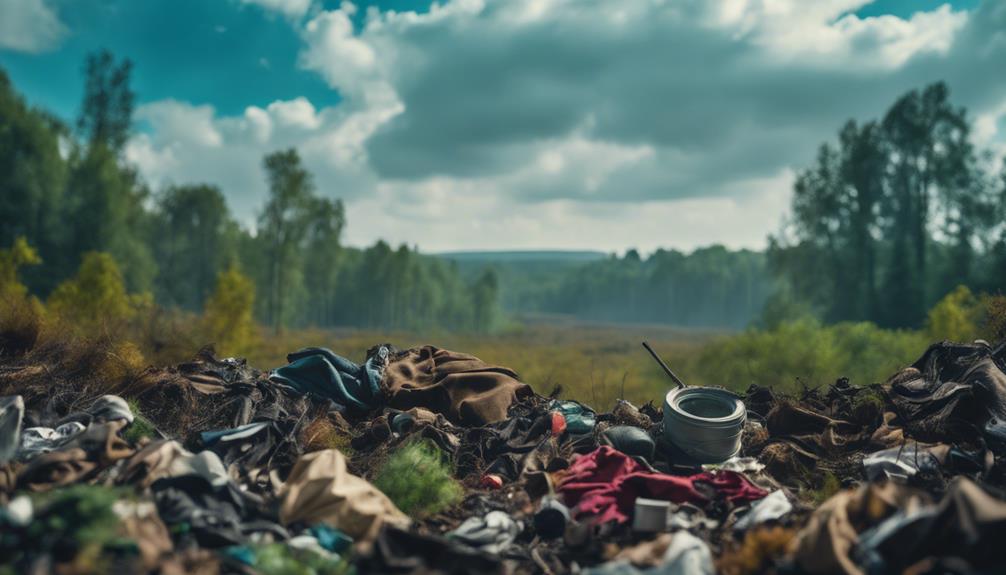Sustainable fashion prioritizes eco-friendly practices and ethical standards, reshaping your perspective on clothing. It advocates for quality over quantity, urging you to invest in long-lasting pieces crafted from biodegradable or recycled materials. This shift is vital because the fashion industry significantly contributes to pollution and unethical labor practices. Opting for sustainable choices not only helps preserve the planet, but also ensures fair working conditions for garment workers. Surprisingly, every purchase you make has the power to drive positive change in the industry. Stay tuned to learn more about this influential trend!
Key Takeaways
- Sustainable fashion prioritizes eco-friendly practices, focusing on quality over quantity and promoting biodegradable and recycled materials.
- It significantly reduces the fashion industry's harmful environmental impact, including pollution and greenhouse gas emissions.
- Ethical labor practices ensure fair wages and safe working conditions, combating exploitation in fast fashion.
- Consumer awareness and demand for sustainable options are rising, encouraging brands to adopt transparent and responsible practices.
Definition of Sustainable Fashion
Sustainable fashion means creating and wearing clothing that prioritizes eco-friendly practices and ethical standards, reducing environmental impact while promoting humane working conditions.
This approach focuses on slow fashion, which emphasizes quality over quantity and encourages conscious consumerism. By choosing sustainable fashion, you're making a deliberate decision to support brands that prioritize ethical practices and the well-being of workers.
The movement advocates for the use of biodegradable materials, such as organic cotton, wool, and hemp, which lessen reliance on non-renewable resources. Additionally, recycled fabrics play an essential role in minimizing waste and pollution.
In contrast to fast fashion, which churns out low-quality garments at a rapid pace, sustainable fashion seeks to create a system with no negative footprint.
When you opt for sustainable clothing, you contribute to a circular economy that values longevity and reduces the environmental impact of textile production.
Every purchase you make can support humane working conditions and promote a healthier planet. By embracing sustainable fashion, you're not just wearing clothes; you're making a statement about your values and the future of the fashion industry.
Importance of Sustainable Fashion

Sustainable fashion's importance can't be overstated; it directly reduces the fashion industry's harmful environmental impact and promotes ethical labor practices.
By choosing sustainable options, you contribute to a healthier planet and support fair working conditions for those in the industry.
It's time to recognize how your choices can make a real difference.
Environmental Impact Reduction
Many people don't realize that the fashion industry is a major contributor to environmental issues, accounting for 20% of global industrial water pollution and significant greenhouse gas emissions. Adopting sustainable fashion practices can drastically reduce this environmental footprint. Here's how:
- Biodegradable materials minimize long-term waste in landfills.
- Eco-friendly dyes decrease toxic runoff and protect water quality.
- Recycling and upcycling help extend the life of garments, reducing resource depletion.
When you choose sustainable materials, you're not just making a style choice; you're actively participating in a movement that prioritizes the planet.
For instance, producing a single T-shirt consumes around 2,700 liters of water. By opting for brands that use biodegradable fabrics and eco-friendly dyes, you can conserve water and reduce greenhouse gas emissions.
Sustainable fashion not only benefits the environment but also encourages a shift in how we view consumption. By embracing these practices, you contribute to a healthier planet and a more responsible fashion industry that prioritizes the well-being of our resources.
Ethical Labor Practices
Choosing eco-friendly fashion not only helps the planet but also supports ethical labor practices that guarantee fair wages and safe working conditions for everyone involved in the production process.
When you opt for sustainable fashion, you're actively combating the exploitative labor practices often seen in fast fashion. These unethical methods frequently result in low pay and hazardous environments for workers.
By prioritizing brands that uphold ethical standards, you contribute to a more equitable fashion industry. Transparency in supply chains is essential, as it allows you to make informed choices about the brands you support. As documentaries and awareness campaigns reveal the injustices faced by workers, consumer demand for ethical labor practices grows stronger.
When you choose sustainable fashion, you're not just making a style statement—you're advocating for fair wages and safe working conditions for all. This shift fosters an industry that values human welfare alongside environmental sustainability.
Together, we can create a fashion landscape that respects workers' rights, promotes social equity, and leads to a brighter future for all involved. Your choices matter, and they can drive meaningful change in the fashion world.
Key Sustainable Practices

Key sustainable practices in fashion focus on ethical labor, circularity, and quality, helping to reshape the industry for a more responsible future. These practices not only promote eco-friendly products but also encourage you, as a consumer, to make informed choices that benefit the planet and its people.
Here are some key sustainable practices to contemplate:
- Ethical fashion guarantees fair labor practices and humane treatment of workers.
- Circular economy emphasizes recycling and upcycling, aiming to reduce waste and extend clothing lifecycles.
- Slow fashion prioritizes high-quality, long-lasting garments, shifting away from the fast fashion model.
Environmental Impact of Fashion

The fashion industry regularly contributes to environmental degradation, with its practices resulting in significant greenhouse gas emissions and water pollution. Fast fashion, characterized by rapid production and low prices, drives this issue, accounting for about 10% of global greenhouse gas emissions. Additionally, it contributes to 20% of global industrial water pollution, emphasizing the urgent need for sustainable fashion practices.
By focusing on waste reduction and resource consumption, sustainable fashion seeks to minimize these harmful effects. Currently, only 3% of clothing production uses recycled materials, showcasing a substantial opportunity for improvement. The reliance on synthetic fibers like polyester, derived from fossil fuels, exacerbates microplastic pollution in our oceans and waterways, further damaging ecosystems.
Ethical practices in fashion can help mitigate these environmental impacts. By choosing brands that prioritize sustainable materials and responsible production methods, you can contribute to a healthier planet. By supporting sustainable fashion, you're not only making a stylish choice but actively participating in reducing the environmental footprint of an industry that urgently needs transformation.
Your choices can lead to meaningful change in combating the detrimental effects of fashion on our environment.
Consumer Behavior Trends

As consumers become more aware of the environmental impact of their choices, many are shifting towards sustainable fashion brands even when economic hardships arise. This change in consumer behavior is largely driven by heightened awareness of climate emergencies and a desire for ethical practices. Surprisingly, 66% of consumers are willing to pay more for sustainable options, showcasing a commitment to responsible consumption.
Here are some key trends in consumer behavior regarding sustainable fashion:
- Increased willingness to invest in eco-friendly brands, even during financial strain.
- Influence of marketing influencers and social media in promoting sustainable choices.
- Preference for ethical practices, as consumers seek transparency in supply chains.
These trends highlight how individual circumstances and global challenges shape purchasing behavior. As consumers navigate these changing values, brands must adapt their messaging to resonate with evolving expectations. Embracing sustainable fashion isn't just a trend; it's a movement towards a more conscious future in fashion.
Future of Sustainable Fashion

As you look ahead, it's clear that consumer awareness of sustainable practices is growing rapidly, pushing brands to adapt.
Innovative materials and upcoming regulatory changes are set to reshape the fashion landscape, demanding more transparency and responsibility.
The future of sustainable fashion hinges on how businesses respond to these shifts and commit to eco-friendly practices.
Consumer Awareness Growth
Growing awareness of sustainable fashion is reshaping consumer behavior, with many willing to invest more in ethical brands. This shift highlights a growing emphasis on transparency in supply chains and a desire to tackle environmental issues. As a conscious consumer, you're likely considering how your purchasing decisions impact not just the planet but also your health.
Here are some key trends driving this change:
- 66% of consumers are ready to pay more for sustainable brands.
- Social media influencers are raising awareness about sustainable choices, amplifying the message.
- Educational initiatives help you understand the importance of sustainable fashion and its broader impacts.
As climate emergencies and global crises heighten consumer consciousness, more individuals prioritize ethical purchasing. By making informed choices, you contribute to a growing movement that values sustainability and accountability in the fashion industry.
Embracing these principles helps guarantee a healthier planet for future generations while also supporting brands committed to ethical practices. You hold the power to influence change with every purchase you make!
Innovative Material Developments
Innovative materials are revolutionizing sustainable fashion, offering eco-friendly alternatives that reduce environmental impact and enhance resource efficiency. Biodegradable materials like organic cotton and TENCEL™ provide significant improvements over traditional fabrics. You'll be pleased to know that recycled fibers, such as ECONYL®, not only divert waste from landfills but also minimize the carbon footprint by saving resources during production.
| Material Type | Environmental Impact |
|---|---|
| Biodegradable Materials | Break down naturally, reducing waste |
| Organic Cotton | Uses less water and avoids harmful pesticides |
| TENCEL™ | Made from sustainably sourced wood pulp |
| Recycled Fibers | Diverts waste and conserves resources |
| Innovative Alternatives | Includes pineapple leather and ocean trash polyester |
Textile recycling technologies are making it easier for brands to reclaim materials, cutting down on production waste and reliance on virgin materials. By opting for these sustainable materials, you'll contribute to a fashion industry that lowers energy use and avoids harmful chemicals often associated with synthetic fabrics. Embracing these innovations is essential for a more sustainable future in fashion.
Regulatory Changes Ahead
Recent advancements in sustainable materials are setting the stage for significant regulatory changes that aim to reshape the fashion industry's approach to environmental accountability. As a consumer, you'll notice an increasing push for transparency in the industry, compelling brands to openly disclose their production processes and labor conditions.
Here are some key factors driving these regulatory changes:
- Mandatory reporting on environmental impacts and resource use by fashion companies.
- Increased consumer awareness of sustainability issues, prompting stricter regulations on waste management.
- Eco-labeling initiatives that require brands to validate their sustainability claims.
These changes reflect a growing commitment to sustainable fashion, challenging brands to adapt to new expectations. Expect to see regulations that not only enforce better recycling practices but also demand accountability from companies regarding their environmental impacts.
As these developments unfold, you'll have the power to make informed choices, supporting brands that prioritize sustainability and transparency. This movement isn't just about compliance; it's about fostering a culture of responsibility within the fashion industry.
Frequently Asked Questions
What Is Sustainable Fashion and Why Is It Important?
Sustainable fashion's about making choices that protect the planet and promote fairness. You're reducing environmental harm while supporting ethical practices, ensuring workers are treated right, and embracing styles that resonate with conscious living. Sustainable fashion essentials include pieces made from eco-friendly materials, such as organic cotton or recycled polyester, and garments produced in factories with fair labor conditions. By investing in these essentials, you are not only contributing to a more sustainable and ethical fashion industry, but also creating a more mindful and impactful wardrobe. Additionally, choosing timeless and versatile pieces that can be worn for years to come is another key aspect of sustainable fashion essentials.
What Is Sustainable Fashion and Why Should We Care?
You should care about sustainable fashion because it reduces environmental harm, promotes ethical labor practices, and meets consumer demand for responsible choices. By supporting these brands, you contribute to a healthier planet and fairer industry.
What Is Sustainability and Why Is It Important?
Sustainability's a lifeline for our planet; it guarantees we meet today's needs without robbing tomorrow. You've got the power to make choices that protect ecosystems, reduce waste, and foster a healthier future for everyone.
Why Are People Interested in Sustainable Fashion?
You're interested in sustainable fashion because it aligns with your values, promotes ethical consumption, and reduces environmental harm. Plus, you want to support brands that prioritize transparency and responsibility in their production practices.
Conclusion
Sustainable fashion isn't just a trend; it's a movement that's reshaping our world for the better.
You might think it's all about sacrificing style, but imagine walking down the street in a stunning outfit that not only turns heads but also tells a story of care for our planet.
By choosing sustainable options, you're not just looking good—you're contributing to a healthier Earth, inspiring others, and proving that fashion can be both chic and responsible.









